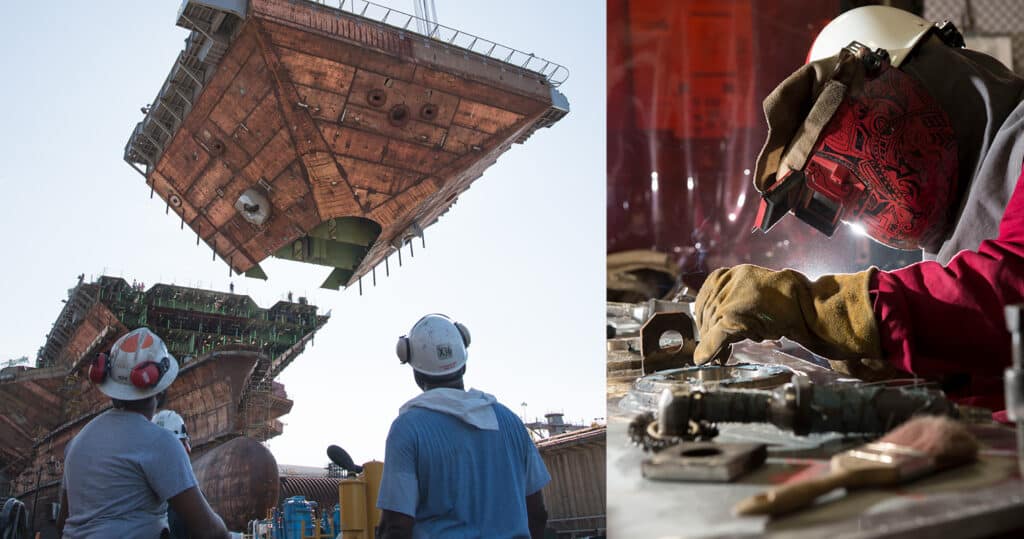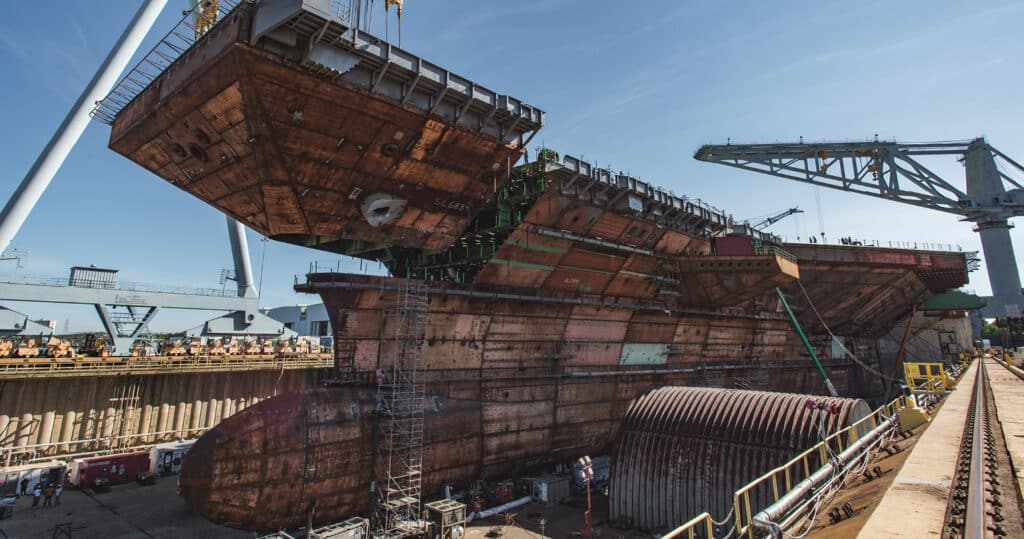Shipbuilding Case Gains Steam
Plan Helps Chart Course to Revitalizing Domestic Industry

The USW-led petition aimed at reviving domestic shipbuilding got a boost this spring when the U.S. Trade Representative (USTR) released a plan to address the predatory practices China has used to dominate the shipbuilding sector.
The Section 301 petition, which the USW and four other labor groups filed in March 2024, called for an investigation of Chinese shipbuilding and encouraged the USTR to counter Chinese government policies that have decimated U.S. shipbuilding.
“This yearlong process now spans two administrations, and we look forward to continuing to work with our trade representative and Congress to ensure a bipartisan, durable approach,” said International President David McCall. “The USTR’s thorough investigation validated our charges, and this announcement lays out a series of strong steps to restore U.S. shipbuilding capacity.”

Trade Remedies
Section 301 of the Trade Act gives the USTR the power to investigate and respond to trade practices that unfairly restrict U.S. commerce.
Other unions that signed onto the 2024 petition included the International Association of Machinists and Aerospace Workers, the International Brotherhood of Boilermakers, the International Brotherhood of Electrical Workers, and the Maritime Trades Department, AFL-CIO.
Then-USTR Katherine Tai quickly launched an investigation and then issued a report the following January, shortly before leaving office, laying out the Chinese government’s effort to dominate the maritime industry.
While Tai’s report illustrated how those practices contributed to the loss of thousands of good American jobs, it was unclear whether the new administration would respond.
Executive Order
A few months after taking office, however, the new USTR, Jamieson Greer, issued his plan to reduce China’s grip on the industry and provide funding to boost U.S. capacity. The president also signed an executive order intended to help the cause.
Greer’s plan includes fees on Chinese vessel operators and owners, restrictions on liquefied natural gas exports, and fees for vehicle carriers. The USTR also proposed additional levies on cargo equipment.
McCall said the effort could affect tens of thousands of American workers.
“At one time, we had several dozen major shipyards in this country, but now we’re down to just a handful,” he said. “That correlates with more than 70,000 lost shipbuilding jobs, not to mention all the secondary jobs the industry supports.”
Many of those jobs are in industries where USW members work. One ship can require about 13,000 tons of structural steel, 60,000 gallons of paint, 130 miles of electrical cable, as well as aluminum, glass and numerous other union-made products.

Long-Term Success
International Vice President Roxanne Brown said that the effort to restore U.S. capacity would help all American workers by building on the Biden administration’s success in restoring U.S. manufacturing through infrastructure investments, Buy American policies and other initiatives.
“Reviving our nation’s shipbuilding industry will enable us to expand those investments, ensure a steady supply of goods, and grow the middle class,” Brown said.
Scott Paul, president of the Alliance for American Manufacturing, said China’s dominance of the shipbuilding industry could have “disastrous repercussions.”
McCall agreed, noting that the USTR’s plan and the president’s order are just two steps toward the long-term goal of restoring a vital U.S. industry.
“It will clearly take a concerted effort and ongoing commitment,” McCall said, “to revitalize our capacity, strengthen our supply chains, launch vessels and ensure workers have the needed training to build and crew American-made ships.”
By clicking Sign Up you're confirming that you agree with our Terms and Conditions.
Recent News Articles
Want to Learn More?
See how the USW is making a real difference in our communities and our workplaces.

